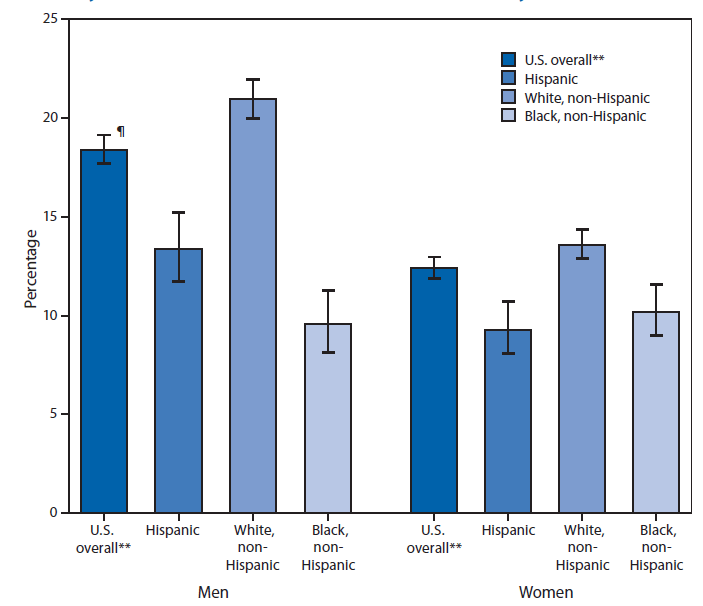QuickStats: Percentage of Adults Aged ≥18 Years with Trouble Hearing,* by Sex and Race/Ethnicity† — National Health Interview Survey, United States, 2012§

* Based on responses to the following question: "Without the use of hearing aids or other listening devices, is your hearing excellent, good, a little trouble hearing, moderate trouble, a lot of trouble, or are you deaf?" For this figure, "a little trouble hearing," "moderate trouble," "a lot of trouble, " and "deaf" are combined into a single category, "trouble hearing." Unknowns were not included in the denominators when calculating percentages of "trouble hearing."
† Refers to persons who are of Hispanic ethnicity and might be of any race or combination of races. "Non-Hispanic" refers to all persons who are not of Hispanic ethnicity, regardless of race.
§ Estimates are based on household interviews of a sample of the noninstitutionalized U.S. civilian population and are age adjusted to the projected 2000 U.S. population as the standard population using four age groups: 18–44, 45–64, 65–74, and ≥75 years.
¶ 95% confidence interval.
** Includes other races/ethnicities not shown separately.
Overall, in 2012, non-Hispanic white adults were more likely to report having trouble hearing compared with Hispanic adults and non-Hispanic black adults. Men (18%) were more likely to report having trouble hearing than women (12%). Among Hispanic and non-Hispanic white adults, men were more likely to report having trouble hearing; however, this pattern was not observed for non-Hispanic black adults, among whom no statistically significant difference was observed between men and women.
Source: Blackwell DL, Lucas JW, Clarke TC. Summary health statistics for U.S. adults: National Health Interview Survey, 2012. Vital Health Stat 2014;10(260). Available at http://www.cdc.gov/nchs/data/series/sr_10/sr10_260.pdf.
Reported by: Jacqueline W. Lucas, MPH, jacqueline.lucas@cdc.hhs.gov, 301-458-4355; Tainya C. Clarke, PhD; Debra Blackwell, PhD.
Alternate Text: The figure above is a bar chart showing the percentage of adults aged ≥18 years with trouble hearing, by sex and race/Ethnicity in the United States during 2012. Overall, in 2012, non-Hispanic white adults were more likely to report having trouble hearing compared with Hispanic adults and non-Hispanic black adults. Men (18%) were more likely to report having trouble hearing than women (12%). Among Hispanic and non-Hispanic white adults, men were more likely to report having trouble hearing; however, this pattern was not observed for non-Hispanic black adults, among whom no statistically significant difference was observed between men and women.
Use of trade names and commercial sources is for identification only and does not imply endorsement by the U.S. Department of
Health and Human Services.
References to non-CDC sites on the Internet are
provided as a service to MMWR readers and do not constitute or imply
endorsement of these organizations or their programs by CDC or the U.S.
Department of Health and Human Services. CDC is not responsible for the content
of pages found at these sites. URL addresses listed in MMWR were current as of
the date of publication.
All MMWR HTML versions of articles are electronic conversions from typeset documents.
This conversion might result in character translation or format errors in the HTML version.
Users are referred to the electronic PDF version (http://www.cdc.gov/mmwr)
and/or the original MMWR paper copy for printable versions of official text, figures, and tables.
An original paper copy of this issue can be obtained from the Superintendent of Documents, U.S.
Government Printing Office (GPO), Washington, DC 20402-9371;
telephone: (202) 512-1800. Contact GPO for current prices.
**Questions or messages regarding errors in formatting should be addressed to
mmwrq@cdc.gov.
 ShareCompartir
ShareCompartir


